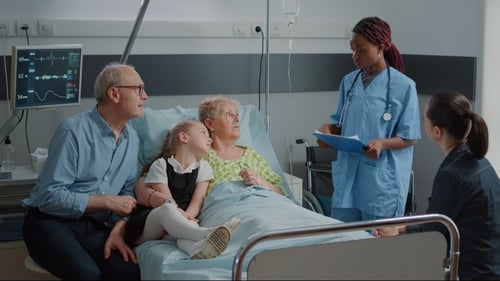Ovarian Cancer: Targeted and Immunotherapies
Targeted and Immunotherapies for Ovarian and Related Cancers
This section covers the following topics:
What is ?
is a type of cancer treatment designed to attack or kill cancer cells, while sparing normal cells as much as possible. They are designed to target abnormal proteins, receptors or genes that are found in cancer cells or the surrounding tissue. Targeted therapies are used to treat advanced ovarian cancer. Two targeted therapies most commonly used for ovarian cancer are:
- Avastin (bevacizumab)
- PARP inhibitors
PARP inhibitors
PARP inhibitors work by blocking a protein used by cells to repair damaged . They were initially developed to treat cancers in people with an inherited gene mutation or mutation. Three PARP inhibitors have been approved for treating ovarian cancer:
- Lynparza ()
- ()
- ()
PARP inhibitors have received approval for after chemotherapy treatment for advanced ovarian cancer to keep the cancer from coming back or growing:
- Lynparza, and have all been approved for after chemotherapy. See the table below for more information about the indication for each drug.
Research is ongoing to learn if PARP inhibitors are also affective for treating ovarian cancer in other situations, including:
- people with an in a different gene that repairs damage (for example: , , , ).
- people who do not have an inherited gene mutation, but tumor testing found an acquired tumor mutation in a gene that repairs damage.
- in combination with or other agents.
Visit our research section to find ovarian cancer treatment research studies.
Other targeted therapies
Targeted therapies are often given to people based on specific changes in their cancer cells. Tumor testing can help doctors identify the patients most likely to benefit from a . Below is a list of some of the targeted therapies that may be used to treat certain types of ovarian cancer, often after chemotherapy stops working.
- ELAHERE (mirvetuximab soravtansine-gynx) may be used for recurrent ovarian cancer that tests positive for a known as FRα (folate receptor alpha).
- Vitrakvi (larotrectinib) is approved for treatment of ovarian cancer that is or cannot be removed with surgery and has worsened with other treatments. It targets a specific genetic change called an NTRK fusion. This type of genetic change is found in a range of cancers.
- Enhertu (trastuzumab deruxtecan) is a type of targeted therapy approved for treatment of advanced, platinum-resistant ovarian cancer if tumor testing shows a called .
- Retevmo (Selpercatinib) if tumor testing is positive for a called RET gene fusion.
Speak with your doctor if you have advanced ovarian cancer and you are not sure if you had testing, or if you don't understand your test results.
Researchers are studying new ways to use targeted therapies to treat endometrial cancer. Visit our Featured Research section for more information.
What is ?
Immunotherapies are cancer treatments that help the body’s immune system detect and attack cancer cells. Immune checkpoint inhibitors are a type of used to treat several types of cancer, including some types of ovarian cancer. Some cancer cells can switch off the immune system. Immune checkpoint inhibitors are drugs that prevent this from happening. This allows the immune system to find, unmask and destroy cancer cells.
- Keytruda (pembrolizumab) is an immune check point inhibitor approved for treatment of cancer with a known as (or ). Although this is not common in ovarian cancer, it is often seen in people with a gene mutation who develop cancer. It is also approved for treating people with a known as TMB-high.
- Jemperli (dostarlimab) is an approved for treatment of cancer with a known as (or ). Although this is not common in ovarian cancer, it is often seen in people with a gene mutation who develop cancer.
In the News
Participate in Research
Study of a New Investigational Inhibitor to Treat People with Advanced Solid Tumors
Clinicaltrials.gov identifier: NCT05932862
|
Name of Drug |
Cancer |
Line of Treatment |
Indication |
|
Type of Agent |
|
Avastin (bevacizumab) |
2, 3 or 4 |
treatment |
Combined with front-line chemotherapy, then continued as a single agent following initial surgery to remove the cancer |
No required |
that blocks the blood supply to tumors by targeting a protein called VEGF (Vascular endothelial growth factor) |
|
Avastin (bevacizumab) |
3 or 4 |
maintenance therapy |
Combined with Lynparza () for platinum-sensitive cancer |
|
that blocks the blood supply to tumors |
|
Avastin (bevacizumab) |
3 or 4 |
Second or third-line |
Combined with chemotherapy for platinum-resistant recurrent disease |
No required |
that blocks the blood supply to tumors |
|
Avastin (bevacizumab) |
3 or 4 |
Second-line or later |
Combined with chemotherapy, followed by Avastin as a single agent, for platinum-sensitive recurrent diesase |
No required |
that blocks the blood supply to tumors |
|
Lynparza () |
3 or 4 |
maintenance |
For people who had a complete or partial response to platinum chemotherapy |
|
Type of known as a |
|
Lynparza () |
3 or 4 |
maintenance |
Combined with Avastin (bevacuzimab) for people who had a complete or partial response to platinum chemotherapy |
|
Type of known as a |
|
() |
3 or 4 |
maintenance |
For people who had a complete or partial response to platinum chemotherapy |
No required |
Type of known as a |
|
Lynparza
|
3 or 4 |
Second-line or later maintenance |
For people who had a complete or partial response to platinum chemotherapy |
No required |
Type of known as a |
|
ELAHERE (mirvetuximab soravtansine-gynx) |
3 or 4 |
Second-line or later |
For treatment of platinum-resistant or platinum-sensitive recurrent ovarian cancer |
Positive for FRα (folate receptor alpha) |
Antibody-drug conjugate (chemotherapy attached to antibody targeting FR-α receptor) |
|
Enhertu (fam-trastuzumab-deruxtecan-nxki) |
or unresectable |
Second-line or later |
For adults with unresectable or , solid tumors who have received prior systemic treatment and have no alternative treatment options |
overexpression () |
Antibody-drug conjugate (chemotherapy attached to antibody targeting receptor) |
|
Keytruda (pembrolizumab) |
or unresectable cancers |
Second-line or later |
For treatment of that have progressed after treatment and for which there are no other treatment options |
|
Type of known as an immune checkpoint inhibitor |
|
Keytruda (pembrolizumab) |
or unresectable cancers |
Second-line or later |
For treatment of that have progressed after treatment and for which there are no other treatment options |
TMB-H (tumor mutational burden-high) |
Type of known as an immune checkpoint inhibitor |
|
Vitrakvi (larotrectinib) |
solid tumors |
Second-line or later |
For treatment in solid tumors for which there are no other treatment options |
NTRK fusion |
known as a kinase inhibitor |
|
Retevmo (Selpercatinib) |
solid tumors |
Second-line or later |
For treatment in solid tumors for which there are no other treatment options |
RET gene fusion |
known as a kinase inhibitor |



